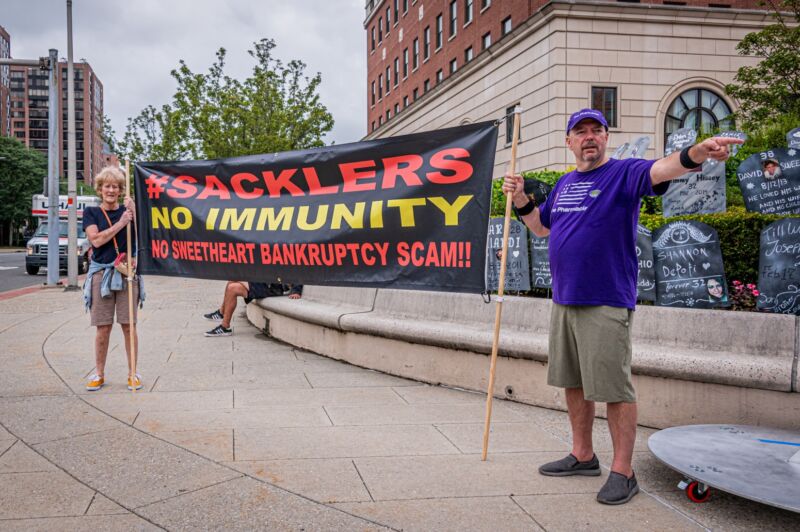
The Sackler family is threatening to back out of a $4.5 billion opioid settlement if it is not granted broad immunity from lawsuits. The pending settlement between the Sacklers and 15 states includes an immunity provision, but other states oppose it, and a bankruptcy court judge is still considering whether to approve the deal.
Forty-one-year-old David Sackler, a former Purdue Pharma board member and grandson of one of the company’s founders, “vowed in court on Tuesday that the family would walk away from a $4.5 billion pledge to help communities nationwide that have been devastated by the opioid epidemic, unless a judge grants it immunity from all current and future civil claims associated with the company,” The New York Times wrote.
“We need a release that’s sufficient to get our goals accomplished,” Sackler said in testimony via video at a hearing in US Bankruptcy Court for the Southern District of New York. “If the release fails to do that, we will not support it.” The family is worth $11 billion, a fortune boosted substantially by sales of OxyContin.
Without immunity protecting the Sacklers from lawsuits over the activities of Purdue Pharma, “I believe we would litigate the claims to their final outcomes,” Sackler said, according to CBS News.
Sacklers and Purdue “hook[ed] Americans on opioids”
Previously, the Sacklers and 15 states agreed to a settlement that would have the family pay $4.325 billion over nine years “to fund prevention, treatment, and recovery programs in communities across the country,” an announcement from New York Attorney General Letitia James said on July 8. The total settlement is $4.5 billion because the Sacklers would also have to “relinquish control of family foundations” that have at least $175 million in assets to a new group that will be “dedicated to abating the opioid crisis.”
The agreement will “shut down Purdue Pharma and end the Sackler family’s ability to manufacture opioids ever again” and “make public tens of millions of documents related to the company and the family’s roles in igniting the opioid crisis—requiring unprecedented disclosure about the role Purdue and the Sacklers played in hooking Americans on opioids,” the announcement said.
The settlement’s inclusion of legal immunity for the family has drawn plenty of criticism and has become a focus of the hearings on whether to approve the deal. “Two offices of the US Justice Department, nine states, and the District of Columbia are objecting to the company’s settlement plan largely because it would grant legal protection to members of the wealthy Sackler family even though none of them are declaring bankruptcy themselves,” CBS News wrote.
As The New York Times noted, “objections to the legal shield for the Sacklers have become the sharp focus of much of the testimony. The details of the Sacklers’ liability releases are so far-reaching that last week Judge Robert Drain himself said he had ‘some concerns about the breadth.'”
In his testimony, Sackler “said the family anticipated that the liability shield would cover him, other members of his extensive family, and about 1,000 other individuals, including contractors and consultants, and protect them from lawsuits that had nothing to do with opioids,” the Times wrote. “That means they would be forever immunized from any current and future lawsuits worldwide related not only directly to Purdue’s opioids but to other drugs the company makes, including drugs for addiction reversal, high cholesterol and even constipation as a result of taking prescription opioids.”
Billionaires “manipulate bankruptcy system”
The Sacklers’ stance is nothing new. In September 2019, they threatened to not agree to any settlement that didn’t include immunity. At that time, Massachusetts Attorney General Maura Healey said, “It’s yet another effort by Purdue to avoid accountability and shield the Sackler family fortune, and we will be opposing it.”
Healey nonetheless agreed to the settlement last month while saying the case has “shown us that our legal system needs to change so that billionaires are never allowed to manipulate the bankruptcy system.”
“In June 2021, AG Healey testified before the US House Oversight Committee about the need for legislation to close the loophole that the Sackler billionaires are using to gain protection from bankruptcy court,” Healey’s announcement pointed out. That legislation—the SACKLER Act (Stop Shielding Assets from Corporate Known Liability by Eliminating Non-Debtor Releases)—hasn’t been approved.
Washington state Attorney General Bob Ferguson and eight other state attorneys general formally objected to the settlement on July 19.
“This settlement plan allows the Sacklers to walk away as billionaires with a legal shield for life,” Ferguson said. “It’s up to the states—not a bankruptcy court—to decide whether states should hold the Sacklers accountable in a court of law. We’re asking the court to reject this flawed proposal. The Sacklers should not be allowed to profit from their misconduct.”
States objecting to the settlement have said the Sacklers could see their wealth rise to $14.6 billion by 2030 through investment returns and interest despite paying $4.325 billion over nine years.
James acknowledged last month that the settlement is flawed but argued that it will do plenty of good and avoid years of costly litigation.
“For nearly two years, since Purdue Pharma declared bankruptcy, the company and the Sackler family have used every delay tactic possible and misused the courts—all in an effort to shield their misconduct,” James said when she announced the settlement. “While this deal is not perfect, we are delivering $4.5 billion into communities ravaged by opioids on an accelerated timetable and it gets one of the nation’s most harmful drug dealers out of the opioid business, once and for all. We’ll be able to more quickly invest these funds in prevention, education, and treatment programs, and put an end to the delays and legal maneuvering that could possibly continue for years and across multiple continents.”
https://arstechnica.com/?p=1788235

